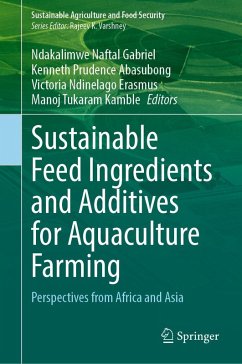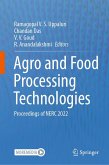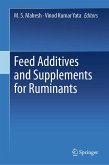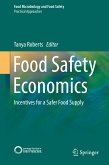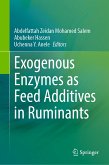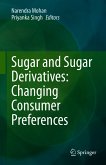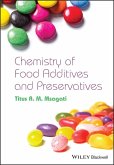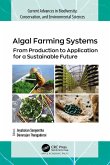Sustainable Feed Ingredients and Additives for Aquaculture Farming (eBook, PDF)
Perspectives from Africa and Asia
Redaktion: Gabriel, Ndakalimwe Naftal; Kamble, Manoj Tukaram; Erasmus, Victoria Ndinelago; Abasubong, Kenneth Prudence


Alle Infos zum eBook verschenken

Sustainable Feed Ingredients and Additives for Aquaculture Farming (eBook, PDF)
Perspectives from Africa and Asia
Redaktion: Gabriel, Ndakalimwe Naftal; Kamble, Manoj Tukaram; Erasmus, Victoria Ndinelago; Abasubong, Kenneth Prudence
- Format: PDF
- Merkliste
- Auf die Merkliste
- Bewerten Bewerten
- Teilen
- Produkt teilen
- Produkterinnerung
- Produkterinnerung

Hier können Sie sich einloggen

Bitte loggen Sie sich zunächst in Ihr Kundenkonto ein oder registrieren Sie sich bei bücher.de, um das eBook-Abo tolino select nutzen zu können.
This book describes sustainable aquaculture ingredients and additives uncovered in Africa and Asia. It also discusses current aquaculture research practices on alternative protein, carbohydrate, lipid, mineral, vitamin, and feed additives. It further demonstrates how aquaculture practices could be a feasible and cost-effective venture, capable of producing products in an environmentally sustainable manner. The aquaculture industry is suffering from scarcity of sustainable feedstuffs, particularly protein and oil components, which play an important role in the nutritional requirements of many…mehr
- Geräte: PC
- ohne Kopierschutz
- eBook Hilfe
- Größe: 28.54MB
![Agro and Food Processing Technologies (eBook, PDF) Agro and Food Processing Technologies (eBook, PDF)]() Agro and Food Processing Technologies (eBook, PDF)186,95 €
Agro and Food Processing Technologies (eBook, PDF)186,95 €![Feed Additives and Supplements for Ruminants (eBook, PDF) Feed Additives and Supplements for Ruminants (eBook, PDF)]() Feed Additives and Supplements for Ruminants (eBook, PDF)161,95 €
Feed Additives and Supplements for Ruminants (eBook, PDF)161,95 €![Food Safety Economics (eBook, PDF) Food Safety Economics (eBook, PDF)]() Food Safety Economics (eBook, PDF)129,95 €
Food Safety Economics (eBook, PDF)129,95 €![Exogenous Enzymes as Feed Additives in Ruminants (eBook, PDF) Exogenous Enzymes as Feed Additives in Ruminants (eBook, PDF)]() Exogenous Enzymes as Feed Additives in Ruminants (eBook, PDF)129,95 €
Exogenous Enzymes as Feed Additives in Ruminants (eBook, PDF)129,95 €![Sugar and Sugar Derivatives: Changing Consumer Preferences (eBook, PDF) Sugar and Sugar Derivatives: Changing Consumer Preferences (eBook, PDF)]() Sugar and Sugar Derivatives: Changing Consumer Preferences (eBook, PDF)81,95 €
Sugar and Sugar Derivatives: Changing Consumer Preferences (eBook, PDF)81,95 €![The Chemistry of Food Additives and Preservatives (eBook, PDF) The Chemistry of Food Additives and Preservatives (eBook, PDF)]() Titus A. M. MsagatiThe Chemistry of Food Additives and Preservatives (eBook, PDF)162,99 €
Titus A. M. MsagatiThe Chemistry of Food Additives and Preservatives (eBook, PDF)162,99 €![Algal Farming Systems (eBook, PDF) Algal Farming Systems (eBook, PDF)]() Algal Farming Systems (eBook, PDF)154,95 €
Algal Farming Systems (eBook, PDF)154,95 €-
-
-
This book helps aquaculture farmers, researchers, the aquafeed industry, investors, students, lawmakers, and other stakeholders in the aquaculture field to comprehend scientific-based sustainable feed ingredients and additives in aquaculture from an African and Asian viewpoint.
Dieser Download kann aus rechtlichen Gründen nur mit Rechnungsadresse in A, B, BG, CY, CZ, D, DK, EW, E, FIN, F, GR, HR, H, IRL, I, LT, L, LR, M, NL, PL, P, R, S, SLO, SK ausgeliefert werden.
Hinweis: Dieser Artikel kann nur an eine deutsche Lieferadresse ausgeliefert werden.
- Produktdetails
- Verlag: Springer Nature Singapore
- Seitenzahl: 585
- Erscheinungstermin: 18. September 2024
- Englisch
- ISBN-13: 9789819742790
- Artikelnr.: 71760056
- Verlag: Springer Nature Singapore
- Seitenzahl: 585
- Erscheinungstermin: 18. September 2024
- Englisch
- ISBN-13: 9789819742790
- Artikelnr.: 71760056
- Herstellerkennzeichnung Die Herstellerinformationen sind derzeit nicht verfügbar.
